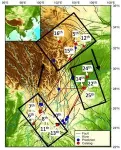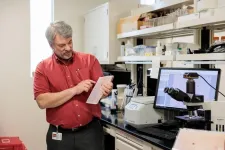(Press-News.org) A new attempt to predict earthquakes with the aid of artificial intelligence has raised hopes that the technology could one day be used to limit earthquakes’ impact on lives and economies. Developed by researchers at The University of Texas at Austin, the AI algorithm correctly predicted 70% of earthquakes a week before they happened during a seven-month trial in China.
The AI was trained to detect statistical bumps in real-time seismic data that researchers had paired with previous earthquakes. The outcome was a weekly forecast in which the AI successfully predicted 14 earthquakes within about 200 miles of where it estimated they would happen and at almost exactly the calculated strength. It missed one earthquake and gave eight false warnings.
It’s not yet known if the same approach will work at other locations, but the effort is a milestone in research for AI-driven earthquake forecasting.
“Predicting earthquakes is the holy grail,” said Sergey Fomel, a professor in UT’s Bureau of Economic Geology and a member of the research team. “We’re not yet close to making predictions for anywhere in the world, but what we achieved tells us that what we thought was an impossible problem is solvable in principle.”
The trial was part of an international competition held in China in which the UT-developed AI came first out of 600 other designs. UT’s entry was led by bureau seismologist and the AI’s lead developer, Yangkang Chen. Findings from the trial are published in the journal Bulletin of the Seismological Society of America.
“You don’t see earthquakes coming,” said Alexandros Savvaidis, a senior research scientist who leads the bureau’s Texas Seismological Network Program (TexNet) — the state’s seismic network. “It’s a matter of milliseconds, and the only thing you can control is how prepared you are. Even with 70%, that’s a huge result and could help minimize economic and human losses and has the potential to dramatically improve earthquake preparedness worldwide.”
The researchers said that their method had succeeded by following a relatively simple machine learning approach. The AI was given a set of statistical features based on the team’s knowledge of earthquake physics, then told to train itself on a five-year database of seismic recordings.
Once trained, the AI gave its forecast by listening for signs of incoming earthquakes among the background rumblings in the Earth.
“We are very proud of this team and its first-place finish in this prestigious competition,” said Scott Tinker, the bureau’s director. “Of course, it’s not just location and magnitude, but timing that matters as well. Earthquake prediction is an intractable problem, and we can’t overstate the difficulty.”
The researchers are confident that in places with robust seismic tracking networks such as California, Italy, Japan, Greece, Turkey and Texas, the AI could improve its success rate and narrow its predictions to within a few tens of miles.
One of the next steps is to test the AI in Texas since the state experiences a high rate of minor- and some moderate-magnitude earthquakes. The bureau’s TexNet hosts 300 seismic stations and more than six years of continuous records, which makes it an ideal location to verify the method.
Eventually, the researchers want to integrate the system with physics-based models, which could be important where data is poor, or places such as Cascadia, where the last major earthquake happened hundreds of years before seismographs.
“Our future goal is to combine both physics and data-driven methods to give us something generalized, like chatGPT, that we can apply to anywhere in the world,” Chen said.
The new research is an important step to achieving that goal.
“That may be a long way off, but many advances such as this one, taken together, are what moves science forward,” Tinker said.
The research was supported by TexNet, the Texas Consortium for Computational Seismology and Zhejiang University. The bureau is a research unit of the Jackson School of Geosciences.
END
AI-driven earthquake forecasting shows promise in trials
2023-10-05
ELSE PRESS RELEASES FROM THIS DATE:
MSU research shows plants could worsen air pollution on a warming planet
2023-10-05
MSU has a satellite uplink/LTN TV studio and Comrex line for radio interviews upon request.
Images
Highlights:
New Michigan State University research published in the journal Proceedings of the National Academy of Sciences shows that plants such as oak and poplar trees will emit more of a compound called isoprene as global temperatures climb.
Isoprene from plants represents the highest flux of hydrocarbons to the atmosphere behind methane.
Although isoprene isn’t inherently bad — it actually helps plants better tolerate insect pests and high temperatures — it can worsen air pollution by reacting ...
Barrow Neurological Institute receives $16.7 million NIH award to help coordinate new national ALS research consortium
2023-10-05
The purpose of the award is to create the Access for All in ALS (ALL ALS) Consortium to conduct clinical research that will include ALS patients nationwide, generating a longitudinal biorepository linked to detailed clinical information that will be made available to research scientists throughout the world using a web-based portal. As part of this new consortium Barrow will manage half of 34 clinical sites in the study which spans the U.S. and Puerto Rico. The consortium will be led by researchers at Barrow, Massachusetts General Hospital and Columbia University.
“Barrow Neurological Institute is honored to be selected by the NIH to help coordinate this ...
How to protect self-esteem when a career goal dies
2023-10-05
Many people fail at achieving their early career dreams. But a new study suggests that those failures don’t have to harm your self-esteem if you think about them in the right way.
Researchers found that people who viewed career goal failures as a steppingstone to new opportunities never lost self-esteem, no matter how many times they failed. But those who thought their failures left them worse off showed a drop-off in how they felt about themselves.
“It’s not how many times you have had to give up. It is how you felt about the failures, and whether you thought they led to something better for you,” ...
Ultrasensitive blood test detects ‘pan-cancer’ biomarker
2023-10-05
Pathology experts engineered an ultrasensitive test capable of detecting a highly specific biomarker found in multiple common cancers
In collaboration with cancer researchers across the country and the globe, the team evaluated the tool’s ability to detect the biomarker in ovarian cancer, gastroesophageal cancer, colon cancer, and other cancers
Diagnostic assays have potential for early cancer detection, monitoring, and prognostics
Marker ‘LINE-1 ORF1p’ is a protein encoded by a human transposon that has further potential applications in tissue diagnostics and may also facilitate treatment of cancers for which no accurate biomarkers ...
Insilico Medicine founder and CEO Alex Zhavoronkov, Ph.D., to present on AI drug discovery at LSX Nordic Congress
2023-10-05
Alex Zhavoronkov, Ph.D., founder and CEO of Insilico Medicine (“Insilico”) will present at the 6th LSX Nordic Conference happening in Copenhagen Oct. 10-11. Zhavoronkov, a leader in generative artificial intelligence (AI) technologies for drug discovery and biomarker development, will present on Oct. 11, 2pm CET on “‘How Artificial Intelligence is Shaping the Future of Drug Discovery, Design, and Development.”
The LSX Nordic Congress is a leading strategy, investment and partnering conference for the Nordic region connecting life science and healthcare ...
Grape consumption benefits eye health in human study of older adults
2023-10-05
In a recent randomized, controlled human study, consuming grapes for 16 weeks improved key markers of eye health in older adults. The study, published in the scientific journal Food & Function looked at the impact of regular consumption of grapes on macular pigment accumulation and other biomarkers of eye health.[1] This is the first human study on this subject, and the results reinforce earlier, preliminary studies where consuming grapes was found to protect retinal structure and function.[2]
Science has shown that an aging population has a higher risk of eye disease and vision problems. Key risk factors for eye disease include 1) oxidative ...
Don’t feel appreciated by your partner? Relationship interventions can help
2023-10-05
When we’re married or in a long-term romantic relationship, we may eventually come to take each other for granted and forget to show appreciation. A new study from the University of Illinois Urbana-Champaign finds that it doesn’t have to stay this way.
The study examined why perceived gratitude from a spouse or romantic partner changes over time, and whether it can be improved through relationship intervention programs.
“Gratitude almost seems to be a secret sauce to relationships, and an important piece to the puzzle of romantic relationships that hasn’t gotten much attention ...
Study confirms age of oldest fossil human footprints in North America
2023-10-05
The 2021 results began a global conversation that sparked public imagination and incited dissenting commentary throughout the scientific community as to the accuracy of the ages.
“The immediate reaction in some circles of the archeological community was that the accuracy of our dating was insufficient to make the extraordinary claim that humans were present in North America during the Last Glacial Maximum. But our targeted methodology in this current research really paid off,” said Jeff Pigati, USGS research geologist ...
More than 10,000 pre-Columbian earthworks remain hidden throughout Amazonian forests
2023-10-05
More than 10,000 Pre-Columbian archaeological sites likely rest undiscovered throughout the Amazon basin, estimates a new study. The findings, derived from remote sensing data and predictive spatial modeling, address questions about the influence of pre-Columbian societies on the Amazon region. “The massive extent of archaeological sites and widespread human-modified forests across Amazonia is critically important for establishing an accurate understanding of interactions between human societies, Amazonian forests, and Earth’s climate,” write the authors. ...
New, independent ages confirm antiquity of ancient human footprints at White Sands
2023-10-05
New radiocarbon (14C) and optically simulated luminescence ages have confirmed the controversial antiquity of the ancient human footprints discovered in White Sands National Park, and reported in a study in 2021. Addressing the widespread criticism of their previous study, researchers report that the independent ages from multiple resolved sources conclusively show that the footprints were left behind between roughly 23,000 and 20,000 years ago, demonstrating that humans were present in southern North America during the Last Glacial ...





